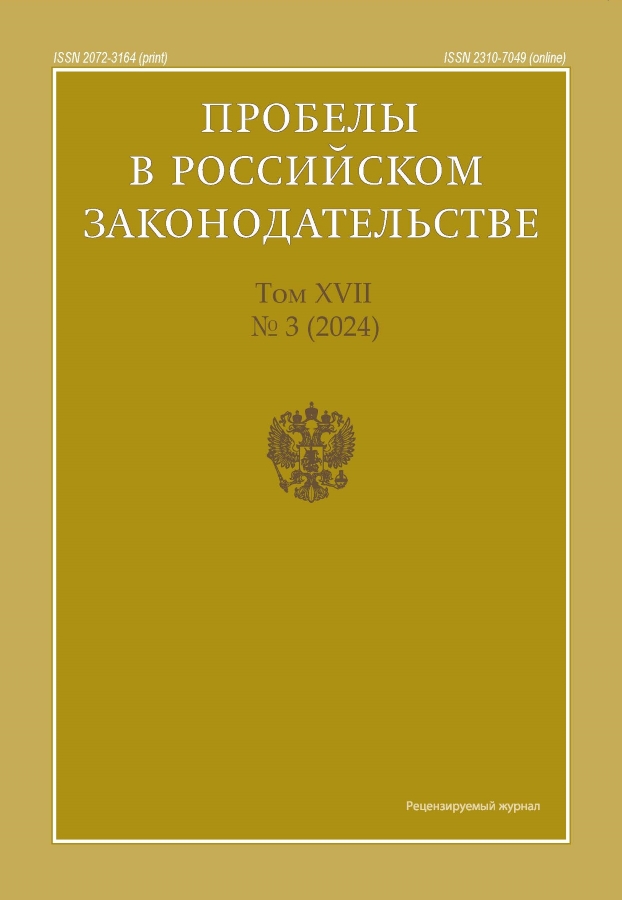The Role of Law in Preserving Traditional Family Values in Modern Russia
- Authors: Dovnar A.N.1
-
Affiliations:
- National Research University “Higher School of Economics”
- Issue: Vol 17, No 3 (2024)
- Pages: 96-104
- Section: Private Law (Civil) Sciences
- URL: https://journals.eco-vector.com/2072-3164/article/view/634213
- EDN: https://elibrary.ru/LBJDDH
- ID: 634213
Cite item
Abstract
Preservation of peoples of Russia and development of human potential is a priority goal of the National Security Strategy of the Russian Federation, the achievement of which is based on the implementation of tasks to preserve traditional family values, increase the birth rate and create motivation for having many children. Unfortunately, the implementation of the declared priorities is hampered by the following problems: 1) changing attitudes towards marriage as a union between a man and a woman, expanding its characteristics by including cohabitation and homosexual relationships; 2) decrease in interest in entering into a civil marriage among modern youth; 3) deliberate delay by people of reproductive age in realizing their potential for conceiving, bearing and raising children; 4) propaganda through the protection of a woman’s right to abortion, including among and in relation to a potential mother who is faced with a choice; 5) unresolved problems in the field of assisted reproduction against the background of the total number of infertile patients. To solve these problems the following proposals are put forward: 1) to make changes to the Family Code of Russia, where the definitions of “marriage” and “family” should be provided; 2) exclude from legislation a woman’s right to artificial termination of pregnancy outside of social and medical indications; 3) provide for new and extend existing measures of state support for families, including those with children; 4) adopt a separate federal law in the field of reproductive rights and human freedoms, where to develop a conceptual apparatus, regulate the rights of participants in legal relations, establish prohibitions and restrictions based on the parity of private and public interests.
Full Text
About the authors
Alexey N. Dovnar
National Research University “Higher School of Economics”
Author for correspondence.
Email: adovnar@hse.ru
SPIN-code: 1189-1937
Scopus Author ID: 1079436
legal consultant of the Legal expertise and educational activities monitoring Center
Russian Federation, MoscowReferences
- Dovnar A.N. Artificial termination of pregnancy: a woman’s reproductive right or violation of the rights of a child // Paradigm of law at the present stage of development of society: from theory to practice: collection of materials from the VIII Student Legal Forum: in 4 volumes / edited by. ed. A.V. Sladkova. – M.: Publishing Center of the University. O.E. Kutafina (MSAL), 2022.- T. 4. P. 18-21.
- Dovnar A.N. The right to abortion: conflict of worldviews and theoretical and practical attempts to overcome it // Modern problems of Russian civil law: electronic scientific publication: collection of scientific articles based on the materials of the All-Russian scientific and practical conference “XIV Ovchinnikov Scientific Readings” (May 24, 2021)/ under total ed. S.S. Chekulaeva, A.G. Kravchenko - Vladivostok: Publishing house VGUES, 2021 - P. 79-83.
- Dovnar A.N. Legal restrictions in the use of reproductive technologies: in search of a balance between private and public interests // Gaps in Russian legislation. 2024. T. 17. No. 1. P. 88-93.
- Eliseeva A.A. Family and family values: approaches to understanding in the conditions of modern law // Current problems of Russian law. 2022. T. 17. No. 3(136). pp. 67-74.
- Kuchumov A.V., Pecheritsa E.V. Threats and risks of demographic security of the Russian Federation // Technical and technological problems of the North. 2020. No. 4(54). pp. 116-120.
- Lomakin I.V. Childfree or voluntarily childless? Towards a redefinition of the conceptual field of research on non-parenting in Russia // Monitoring of public opinion: economic and social changes. 2019. No. 6. P. 394-435.
Supplementary files









